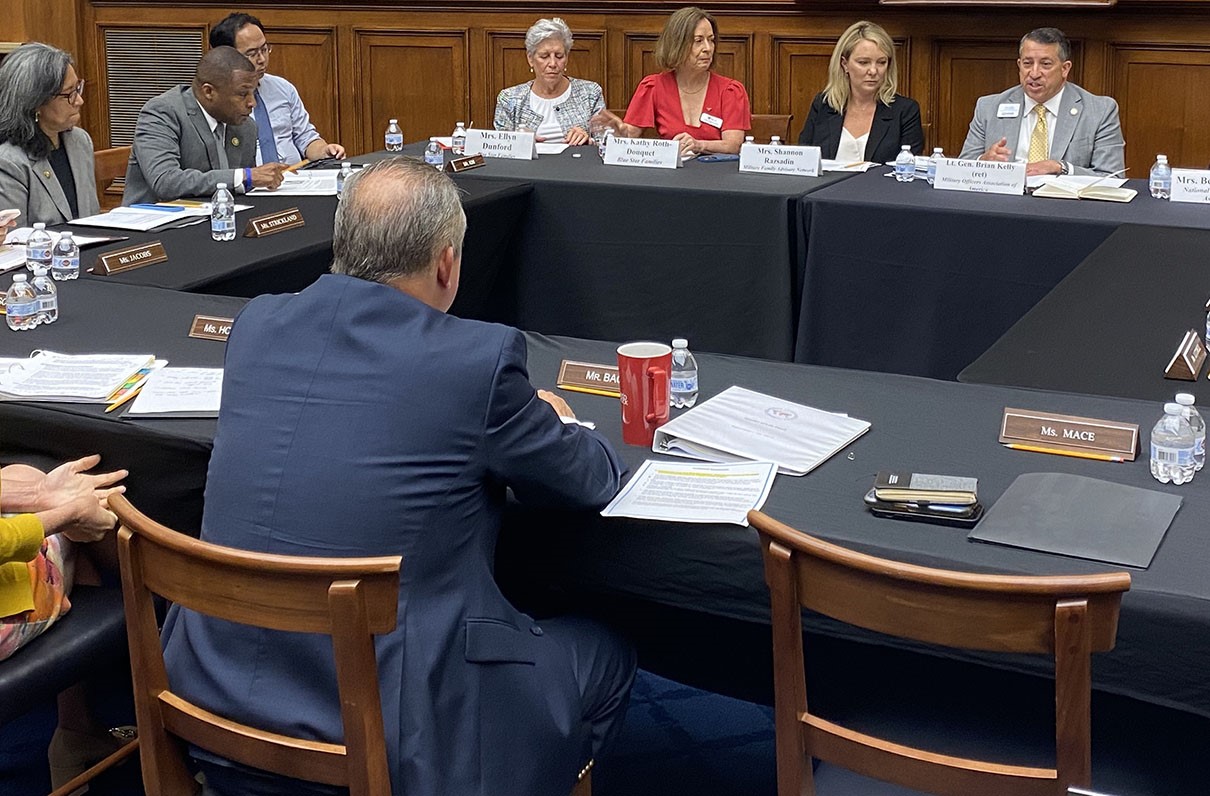By Cory Titus and Jen Goodale
In a powerful display of advocacy for the health and welfare of servicemembers and their families, MOAA President and CEO Lt. Gen. Brian T. Kelly, USAF (Ret), joined fellow advocates July 26 at a House Armed Services Quality of Life roundtable on Capitol Hill, underscoring the urgency of implementing immediate actions and broad reforms to assist the currently serving military community.
“While MOAA is an organization of officers, we are not an association about officers,” Kelly told the panel, where he spoke alongside representatives from the National Military Family Association, Blue Star Families, and the Military Family Advisory Network. “We advocate for a world-class pay and benefits package for all those in uniform, retirees, veterans, their families, and survivors of all ranks across the eight uniformed services.”
Protecting Pay and Benefits
Ensuring adequate compensation for servicemembers is a key component of retaining a skilled and motivated force. Kelly emphasized the significance of reforming the enlisted pay table as a crucial action Congress should pursue.
[READ MORE: MOAA’s Full Testimony to the Quality of Life Panel]
Beyond immediate pay table reforms, he stressed the necessity of looking into broader compensation changes. Comprehensive reviews and adjustments would allow the military to establish equitable and competitive pay structures reflecting the dedication and sacrifices made by its members. This forward-looking approach aims to foster a sustainable environment for career growth and stability within the ranks.
Housing emerged as another critical issue on the panel’s agenda. Kelly proposed restoring the Basic Allowance for Housing (BAH) to 100% as a starting point, acknowledging the significance of stable and suitable housing for military families. Additionally, he advocated for parallel reforms in barracks and Military Housing Privatization Initiative (MHPI) to further ensure the well-being of servicemembers and their families.
[TAKE ACTION: Urge Your Legislators to Pay Full Housing Costs for Servicemembers]
The roundtable discussion extended to the topic of TRICARE cuts, which MOAA continues to oppose. Not only do these reductions betray obligations to servicemembers and retirees, but they also pose a risk of discouraging key influencers in the recruiting process from recommending military service to future generations.
“While potential recruits may not perceive or understand the level of investment in people or recognize when a prior commitment is not kept, influencers among their family and friends absolutely do,” Kelly told the panel, “and those influencers, particularly among those who are serving or who have served, have the biggest impact on whether eligible young Americans choose to serve.”
Recognizing the role of robust and accessible health care benefits in attracting and retaining personnel, Kelly urged the panel to ensure TRICARE policy evolves with new technology, treatment protocols, and benchmarks set by high quality commercial plans while avoiding disproportionate fee increases.
Spouse, Child Care Concerns
Addressing military spouse unemployment emerged as another paramount concern for panel members. Kelly highlighted the federal government's responsibility to track unemployment trends among military spouses accurately, and to provide spouses with ample employment opportunities. By supporting military spouses in their pursuit of careers and financial stability, the government can significantly enhance the overall quality of life for military families.
Kelly also stressed the need to implement standardized and robust incentives to tackle the shortage of health care providers and enhance access to quality child care. Accessible and reliable child care is a pivotal factor in enabling servicemembers to fulfill their duties effectively while ensuring the well-being of their children. By establishing effective incentives and measures, the military can create a supportive environment for families, easing the burden on servicemembers and enhancing their focus on their responsibilities.
[ABOUT THE PANEL: Quality of Life Panel, Led by a MOAA Member, Takes Shape in the House]
Kelly's participation in the roundtable highlighted MOAA’s commitment to advocating for the welfare of servicemembers and their families at all life stages. By implementing these suggested reforms, the military can create a more resilient, motivated, and thriving force, ready to face the challenges of the future. MOAA will continue to engage with panel members as they work on these issues to inform recommendations for the FY 2025 National Defense Authorization Act (NDAA).
Cory Titus is MOAA's Director of Government Relations for Veteran Benefits and Guard/Reserve Affairs. Jen Goodale is MOAA's Director of Government Relations for Military Family and Survivor Policy.
More Members Mean More Influence Over Retirement Pay, Health Care, and Family Programs
Get involved and make sure your interests are addressed. Because the larger our voice is, the greater our impact will be.
